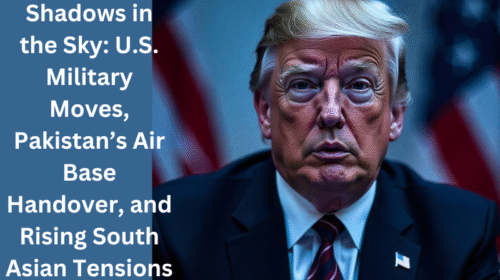Shadows in the Sky: U.S. Military Moves, Pakistan’s Air Base Handover, and Rising South Asian Tensions
A new storm is gradually brewing in a world that is becoming more and more influenced by geopolitical chess, American gaming planes, and military strategy. This time, it involves an explosive combination of strategic handoffs, covert airstrikes, and tensions in the Middle East and South Asia. In the centre of everything? Israel, Iran, Pakistan, India, and America are all playing their cards as the global public attempts to make sense of the hazy situation.
In the skies of the world, American gaming planes
The United States is allegedly flying “American gaming planes” into international airspace, according to claims that surfaced in recent weeks. These are high-tech, complex platforms with advanced simulations and electronic warfare capabilities; they are neither conventional fighter jets nor merely reconnaissance aircraft. Analysts believe that these aircraft are being used to map radar systems, test global defence responses, and even replicate conflict scenarios in hostile regions, even if they are ostensibly deployed for training or drills.
The bigger issue? (American gaming planes ) These planes have been spotted in a number of hotspots, which raises concerns about what and by whom these aircraft are being “gamed.”
Operation Sindoor and the handover of Noor Khan Airbase
In a shocking and mostly unknown development, India’s clandestine Operation Sindoor, an alleged precision attack operation deep within Pakistani territory, is said to have struck Pakistan’s Noor Khan Airbase, one of its most crucial military airbases.
The fact that the airbase at the time held a variety of US platforms and assets added to the attack’s effectiveness. Insiders claim that under the direction of General Asim Munir, the head of Pakistan’s army, a sizable portion of this facility had already been covertly turned over to the US.
According to sources, America has established significant communication, observation, and logistics facilities there (American gaming planes). This could have been done to keep an eye on Chinese and Iranian activity in the area or as part of its heightened interest following the loss of Afghan airspace. In addition to sending a message, India has indirectly impacted American infrastructure with this attack.
Trump’s ‘proud deal’ to avoid nuclear war?
The former US president recently said, in classic Trump way, that the agreement he is most pleased of has nothing to do with trade, taxes, or oil, but rather with secret talks that purportedly could have prevented India and Pakistan from going to nuclear war.
Trump has stated that he assisted in reducing tensions during his presidency when both nations were on the verge of raising tensions, despite the fact that the specifics are ambiguous and unconfirmed. During a campaign stop, Trump declared, “This was the real deal.” “It’s about saving millions of lives, not just business.”
It remains to be seen if this is just another exaggeration or a unique example of covert diplomacy. However, there is no doubt that subcontinental tensions are constantly on the verge of escalation.(American gaming planes)
Israel-Iran tensions: “America knows nothing”?
Regarding the recent Israeli strike on Iranian military installations, US Senator Marco Rubio made an odd remark. He stated unequivocally, “We were not involved.” Additionally, he stated that neither the Israeli attack nor Iran’s counterattack are fully known to the United States.
The assertion has drawn criticism. Is it really possible for a nation with the most potent intelligence services to know what its closest partner is doing militarily? Not possible.
According to some observers, Washington does this to preserve strategic ambiguity. Even when the United States indirectly aids Israeli initiatives through shared intelligence, technology, or weaponry, it can maintain its neutrality by claiming “possible deniability.”
The public, however, is not persuaded. Many people wonder if America is sleepwalking or merely acting as diplomatic cables burn and weapons fly.
Asim Munir: Pakistan’s de facto leader?
General Asim Munir, the head of Pakistan’s army, is becoming more and more well-known worldwide as geopolitical boundaries become more hazy. Recently, he received an invitation to a U.S. military parade, which is an uncommon honour for foreign generals, especially in a difficult area.
The invitation is interpreted as a diplomatic ploy by the United States to recognise the true power brokers in Pakistan. Insiders and onlookers have called Munir “everything Pakistan has,” even if Prime Minister Shahbaz Sharif remains the primary leader.
He is more powerful than any civilian leader because of his strict control over the military, intelligence, and foreign policy. He appears to represent Pakistan’s strength even in Washington.
Conclusion: A global game in progress
The high-tech drone flight (American gaming planes), the attack on a Pakistani airbase, Trump’s assertions, the Israel-Iran crossfire, and the ascent of Asim Munir may all appear to be isolated incidents, but taken as a whole, they show a broader trend: alliance management, war preparations, and shifts in the balance of power.
One thing is evident from the Middle East’s deserts to South Asia’s skies: the pieces are in motion. Depending on who is in charge and if America is actually participating in the game or playing a secret, intricate game of its own, the world may witness a new conflict or a backchannel peace.
